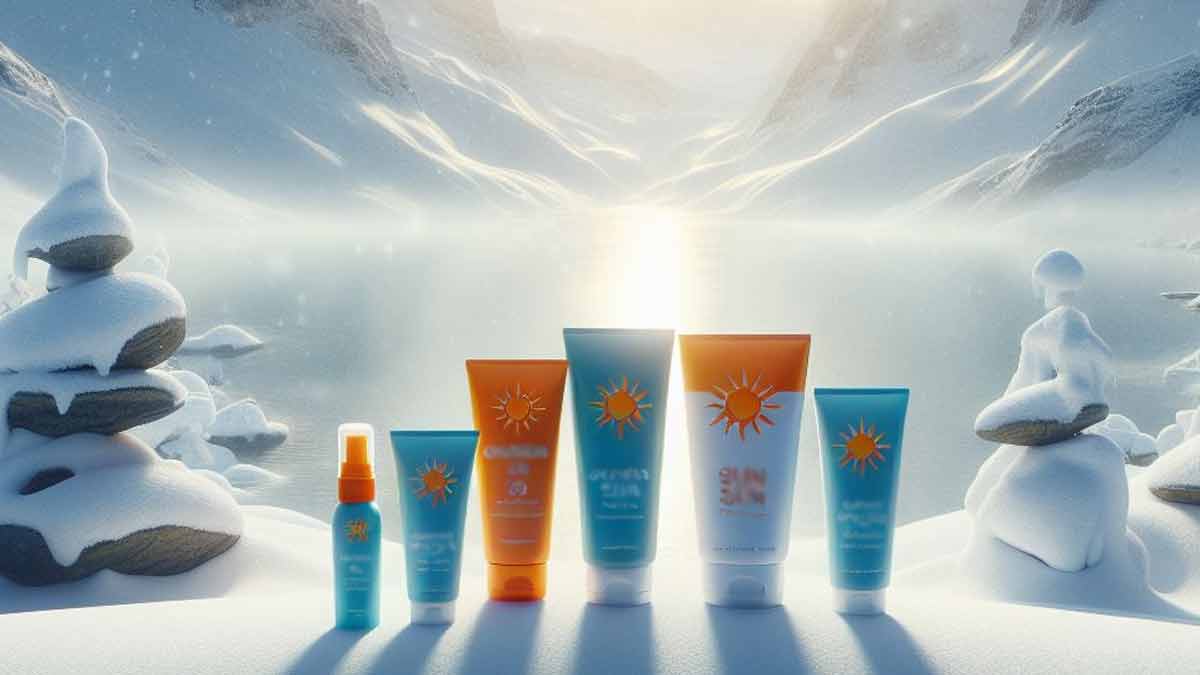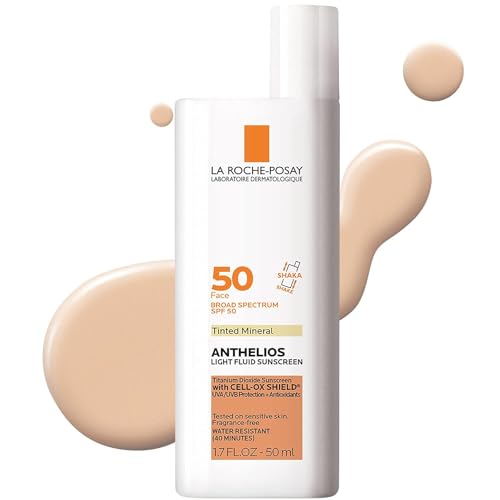Many of us pack away our sunscreen along with our swimsuits as the cold weather sets in, operating under the common misconception that sun protection is only a summertime worry. However, the truth is that UV rays don’t take a winter break. Even during the colder months, the sun continues to emit harmful UV radiation, including UVA and UVB rays, which can lead to premature skin aging, sunburn, dark spots, and, most critically, skin cancer.
A compelling statistic from NIH MedlinePlus Magazine underscores this point, revealing that UVB radiation remains a significant risk in the winter, necessitating the use of sunscreen. This statistic prompts a critical inquiry: as winter approaches, have you considered the essential role of sunscreen in your cold-weather routine, or have you overlooked the importance of protecting your skin from the sun year-round?
More from Glowing Gorgeous: Find out here the Best Silicone-Free Moisturizers And Why Do You Care
Glowing First Glimpse:
- Yes, sunscreen is crucial in winter to protect against UV rays, prevent skin cancer, and avoid premature aging.
- A winter-specific sunscreen can provide the necessary hydration and protection your skin needs during colder months.
- Regular reapplication is key, especially when spending extended periods outdoors in winter.
The Science of UV Rays in Winter
Despite the chill in the air, UV rays from the sun continue to reach us, cutting through the atmosphere regardless of temperature or cloud cover. This includes UVA rays, which are present throughout the year and are responsible for deep skin damage. An often-overlooked aspect of winter is the reflective properties of snow, which can bounce back up to 90% of UV radiation, dramatically increasing exposure compared to non-snowy surfaces.
This dispels the myth that cloudy or snowy days provide a shield against sun damage. In fact, skipping sunscreen in winter can heighten the risk of skin cancer and hasten the appearance of signs of aging, such as wrinkles and fine lines.
Understanding UVA and UVB Rays
UVA and UVB rays affect the skin differently, yet both are harmful. UVB rays are the primary cause of sunburn and play a significant role in developing skin cancer, whereas UVA rays penetrate the skin more profoundly, leading to premature aging and skin damage. Importantly, both types of UV rays are not blocked by clouds and can cause harm year-round, including during winter months. This underscores the importance of using a broad-spectrum sunscreen, which offers protection against the entire UV spectrum, ensuring your skin is shielded from both UVA and UVB rays.
Why Overcast Days Are Deceptive
The misconception that overcast days do not necessitate the use of sunscreen is particularly dangerous. UV rays have the ability to penetrate clouds, meaning your skin is at risk of UV exposure regardless of the weather. This is a critical misunderstanding to correct, as it can lead to unprotected exposure and increased risks of skin damage and skin cancer even on days that appear to be harmless.
Winter Sports and Sunscreen
Individuals who partake in winter sports or spend time outdoors during winter months are at an increased risk of UV exposure, primarily due to the reflective properties of snow. Activities such as skiing, snowboarding, and ice skating can expose you to significant amounts of UV radiation, making it essential to apply a high-quality sunscreen. This is crucial not only for your face but any exposed skin, as reflective UV rays can intensify the potential for sunburn, premature aging, and skin cancer.
Choosing the Right Sunscreen for Winter
As the chill sets in, the need for a sunscreen that not only protects from the harmful UV rays but also hydrates the skin becomes crucial. In winter, our skin tends to be drier and more sensitive; hence, a winter sunscreen should offer a potent combination of sun protection and moisture. The battle between mineral-based and chemical-based sunscreens continues, but for those with deeper skin tones looking to avoid the dreaded white cast, a tinted mineral sunscreen could be the solution.
Additionally, the Skin Cancer Foundation recommends applying two milligrams per square centimeter of skin, which roughly translates to a teaspoon for the face alone. Integrating sunscreen into your winter skin care routine as the final step before makeup ensures maximum effectiveness, allowing the sunscreen to form a protective barrier on the surface of the skin.
Top Winter Sunscreen Picks
For those seeking hydration plus protection, the Neutrogena Hydro Boost Sunscreen is an excellent option.
Its water-gel formula quenches dry skin while offering broad spectrum SPF 50 protection against UVA and UVB rays. Not only does it protect the skin from sun damage, but it also helps lock in moisture for all-day hydration, making it perfect for the winter months. Similarly, the Lancôme UV Expert Primer & Face Moisturizer With SPF 50 is another top pick for winter.
This sunscreen is formulated with hydrating ingredients and offers sun protection without leaving any greasy residue, ideal for those with oily skin types or who dislike the feel of traditional sunscreens.
Price vs. Quantity Analysis
When purchasing sunscreen for winter use, it’s vital to consider both the size and price of the product. A larger, more expensive bottle might seem less appealing at first glance, but if it offers a better price per ounce, it could be more cost-effective in the long run. Comparing these factors can help readers make informed decisions about which sun protection products will not only be beneficial for their skin but also for their wallets.
Best winter sunscreen for my skin type
Selection should be based on your skin type and concerns:
More from Glowing Gorgeous: Find out here Hyram’s Recommended Face Sunscreens For The Summer
For dry skin:
Look for sunscreens with hydrating ingredients like hyaluronic acid or shea butter to nourish the skin while protecting it. A great option is the La Roche-Posay Anthelios Melt-in Milk Sunscreen for Face & Body SPF 60.
This product is renowned for its hydrating properties and broad-spectrum SPF 60 protection, making it an exceptional pick for dry skin in need of moisture and defense against harsh winter UV rays.
For oily skin:
While mineral sunscreens are tempting, they may make oily skin appear even shinier. An oil-free, non-comedogenic sunscreen won’t clog pores or exacerbate oiliness.
Innisfree Daily UV Defense Broad Spectrum SPF 36 sunscreen is perfect for oily skin in winter. Its lightweight, water-based formula hydrates without feeling heavy, ideal for combating winter dryness without adding excess oiliness. Infused with green tea, cica, and sunflower seed oil, it soothes irritated skin while providing essential hydration. The non-greasy, invisible finish ensures no white-cast, making it suitable for everyday wear under makeup. Its SPF 36 protection shields skin from winter sun exposure, preventing damage and maintaining a healthy complexion throughout the season.
For sensitive skin:
Mineral sunscreens, which contain zinc oxide or titanium dioxide, sit on top of the skin rather than being absorbed, making them less irritating for sensitive types. A good choice here is the CeraVe Hydrating Mineral Sunscreen SPF 50 Face Lotion.
It is formulated with essential ceramides and niacinamide, known to calm and repair sensitive skin, alongside mineral-based UV protection.
Application Tips for Maximum Protection
Applying and reapplying sunscreen during the winter is critical, especially when partaking in outdoor activities where UV exposure can be higher. A good rule of thumb is to apply sunscreen 30 minutes before going outside and reapply every two hours or immediately after sweating or swimming.
Don’t forget to cover often-missed spots like the tops of the ears, back of the neck, and hands. Consistent application ensures that your skin remains protected from UV radiation and minimizes the risk of sun damage and skin cancer.
Benefits of Using Sunscreen in Winter
When winter rolls around, you might think it’s safe to stash away the sunscreen with your summer shorts. However, the truth is, those UV rays don’t take a holiday when the temperature drops. Using sunscreen in winter brings a bounty of benefits, from shielding your skin from harmful UV rays to helping prevent the signs of premature aging. Let’s not forget, some sunscreens can double as a moisturizer, making them a win-win for dry, winter skin.
Firstly, protecting your skin from UV radiation is crucial year-round. UVA rays, notorious for causing skin aging, penetrate clouds and even glass, meaning your skin is at risk even on the cloudiest days or while driving. On the flip side, UVB rays, which are responsible for sunburn, may be less intense during winter but can bounce off snow, increasing exposure. Regularly applying a broad-spectrum SPF can significantly reduce the risk of skin damage and, subsequently, skin cancer. The Skin Cancer Foundation continually emphasizes this as a vital step in any skincare routine, regardless of the season.
Furthermore, winter climates can be harsh on the skin, leading to dryness and irritation. Here’s where using sunscreen can also play a moisturizing role. Many sun protection formulas now include hydrating ingredients like glycerin, hyaluronic acid, or shea butter, offering dual benefits. Not only are you protecting your skin from sun damage, but you’re also keeping it hydrated, helping to maintain a healthy skin barrier during the cold months.
Another key benefit of incorporating sunscreen into your winter skin care routine is its role in combating signs of aging, such as fine lines, wrinkles, and dark spots. These unsightly marks are often the result of prolonged UV exposure, which accelerates the breakdown of collagen and uneven skin tone. By using sunscreen, you’re not just protecting your skin today; you’re investing in its future appearance and health.
Finally, the American Academy of Dermatology isn’t shy about reminding us of the importance of sun protection in cold weather to reduce the risk of skin cancer and premature aging. Considering their advice, neglecting sunscreen in your winter arsenal seems like a significant oversight for anyone serious about maintaining their skin health.
Real-Life Testimonials and Expert Opinions
Winter might conjure images of cozy sweaters and snowball fights, but it’s also a time when our skin needs extra protection. Despite the cooler temperatures, the sun’s rays can still cause significant damage. This brings to light the importance of sunscreen, not just for the beach days but also for the winter months. But don’t just take my word for it—let’s hear from those who’ve seen the benefits firsthand and the experts who study skin care for a living.
Sarah, a ski instructor from Colorado, shares her experience: “I never thought about applying sunscreen in the winter until I started noticing freckles and fine lines on my face. I’ve been using broad-spectrum SPF every day for the past year, and I’ve seen a noticeable improvement in my skin’s condition. My skin feels more hydrated, and those dark spots have started to fade. It’s made a huge difference, and now I never hit the slopes without it.”
John, a daily commuter in New York City, noticed his skin’s texture improved when he added sunscreen to his winter routine. “At first, I thought sunscreen was causing my skin to feel greasy, but once I switched to a mineral sunscreen formulated for oily skin, I started to see the benefit. Not only is my skin less irritated, but I also feel better knowing I’m protected from UV exposure.”
Dermatologists universally agree on the necessity of year-round sunscreen application. Dr. Emma Patel, a board-certified dermatologist, points out, “UV radiation isn’t seasonal. Whether it’s sunny, cloudy, or snowy, up to 80% of UV rays can penetrate through and cause skin damage. Winter sports enthusiasts and individuals spending time outdoors should be particularly vigilant. A broad spectrum spf is crucial because it protects against both UVA and UVB rays, the former of which causes skin aging and the latter, skin burning—both can lead to skin cancer.”
The Skin Cancer Foundation also stresses the significance of regular sunscreen application as a proactive measure against skin cancer. “Many people underestimate the sun’s power during winter months. This oversight can lead to an increased risk of skin cancer over time. Incorporating sunscreen into your daily skin care routine is an easy and effective way to protect yourself,” states a representative.
Recommendations from health professionals make it clear: year-round sun protection is a must for maintaining healthy skin. Whether it’s preventing dry skin with a moisturizing formula or choosing a product specifically designed for sensitive skin, there’s a sunscreen out there for everyone. We’ve gathered insights and advice from real people and experts alike, and the consensus is undeniable—winter sunscreen use is not just beneficial but necessary.
FAQs About Winter Sunscreen Usage
Many of us wonder about the real need for sunscreen during the colder months. Let’s clear up some common questions and misconceptions about using sunscreen in winter, tailoring our skin care to the season, and how to choose the best sun protection for our skin type.
Do I really need SPF 50 in the winter?
While the UVB rays, known for causing sunburn, are weaker in winter, UVA rays, which contribute to skin aging and cancer, remain strong year-round. A broad-spectrum SPF 30 or higher is recommended daily, regardless of the temperature, as it effectively blocks out the majority of harmful UV rays. However, if you’re spending extended periods outdoors, especially on snowy days where the sun’s reflection off the snow intensifies UV exposure, bumping up to SPF 50 can offer more comprehensive protection.
Should I be using sunscreen indoors during the winter months?
Yes, you should consider it, especially if you spend a lot of time near windows. Glass can block UVB rays but not the UVA rays that contribute to skin aging and the risk of skin cancer. For indoor protection, a lightweight SPF 30 sunscreen or a moisturizer with added sun protection can defend your skin without feeling too heavy.
Can using sunscreen in the winter help prevent skin cancer?
Absolutely. Since UV rays are present and harmful throughout the year, consistent use of sunscreen, even during winter, plays a critical role in preventing skin cancer. The Skin Cancer Foundation advocates for the use of broad-spectrum coverage all year as part of comprehensive sun safety practices.
Does winter sunscreen application affect Vitamin D absorption?
While it’s true sunscreen can reduce Vitamin D synthesis, the health risks of UV exposure, including skin cancer, outweigh the risk of Vitamin D deficiency. You can maintain healthy Vitamin D levels through diet and supplements, without compromising your skin’s safety.
To wrap it up, integrating sunscreen into your winter skin care routine is not just about preventing sunburn. It’s about a comprehensive approach to protecting your skin from UV radiation, premature aging, and the risk of skin cancer. Choose a sunscreen that complements your skin type and lifestyle, and remember, sun protection is a year-round commitment.
Bottom Line
If there’s one thing I hope you take away from our chat, it’s that slathering on sunscreen during the frosty winter months is not just a good habit—it’s a non-negotiable for maintaining skin health, preventing skin damage, and lowering the risk of skin cancer. The sneaky UV rays don’t go on holiday when the temperature drops; they remain just as eager to make an unwanted mark on your skin. So, let’s not give them that chance.
Reassess your winter skincare routine with a critical eye on protection and nourishment. Consider the long-term investments you’re making in your skin’s future with every application of broad-spectrum SPF. I invite you to dive into our selection of recommended products and discover the best sunscreen for winter tailored to your skin—be it oily, dry, sensitive, or anything in between. Give your skin the shield it deserves and keep it radiant, healthy, and cancer-free.
Sources:
– https://magazine.medlineplus.gov/article/sunscreen-in-the-winter
– https://www.aad.org/public/everyday-care/sun-protection/shade-clothing-sunscreen/cold-weather


 Neutrogena Hydro Boost Moisturizing Water Gel Sunscreen Lotion with Broad...
Neutrogena Hydro Boost Moisturizing Water Gel Sunscreen Lotion with Broad... Lancôme UV Expert Primer & Face Moisturizer with SPF 50 - Prep, Hydration &...
Lancôme UV Expert Primer & Face Moisturizer with SPF 50 - Prep, Hydration &... La Roche-Posay Anthelios Melt-In Milk Body & Face Sunscreen SPF 60, Oil Free...
La Roche-Posay Anthelios Melt-In Milk Body & Face Sunscreen SPF 60, Oil Free... innisfree Daily UV Defense Sunscreen Broad Spectrum SPF 36 Face Lotion, 1.69 Fl...
innisfree Daily UV Defense Sunscreen Broad Spectrum SPF 36 Face Lotion, 1.69 Fl... CeraVe 100% Mineral Sunscreen SPF 50 | Face Sunscreen with Zinc Oxide & Titanium...
CeraVe 100% Mineral Sunscreen SPF 50 | Face Sunscreen with Zinc Oxide & Titanium...
 La Roche-Posay Anthelios Tinted Sunscreen SPF 50, Ultra-Light Fluid Broad...
La Roche-Posay Anthelios Tinted Sunscreen SPF 50, Ultra-Light Fluid Broad...
Comments